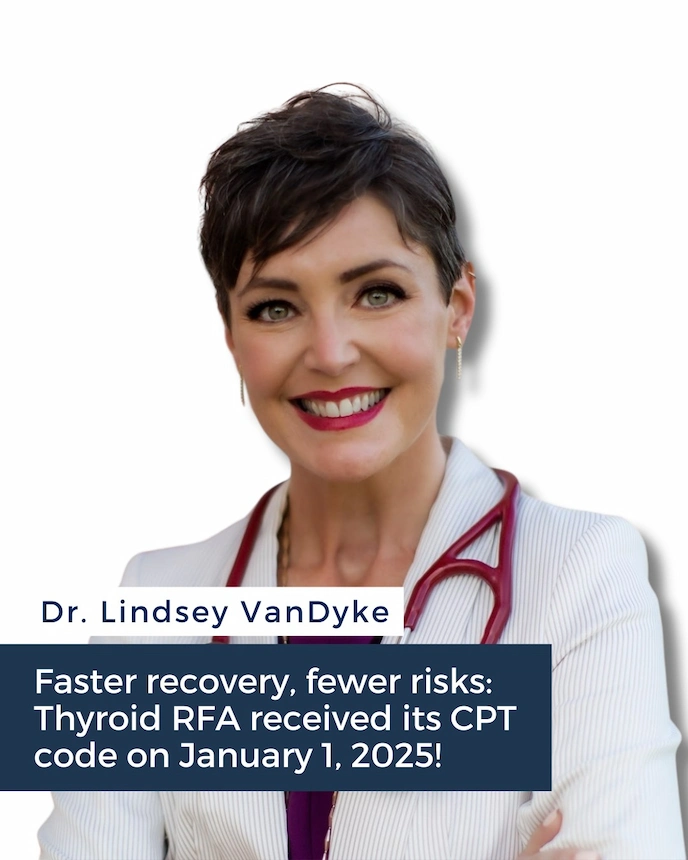As of January 1, 2025, a new CPT code (60660) has been approved for Thyroid Radiofrequency Ablation (RFA). This code validates RFA as a reimbursable, effective, and minimally invasive treatment for benign thyroid nodules, offering patients a safe alternative to surgery with fewer risks and faster recovery.
This new CPT code is a game-changer, ensuring that RFA is now officially recognized for Medicare billing. However, it’s critical to check with your billing department to review the assigned values for this procedure. Understanding the reimbursement structure early can help optimize your practice’s financial potential while providing patients with a sought-after non-surgical solution.
With the introduction of CPT code 60660 starting January 1, 2025, what changes in reimbursement can patients expect, and how will this affect their out-of-pocket costs?
The nationwide average cost for a single nodule RFA procedure has been approximately \$5,000. Some institutions are charging \$7,500 or even more. Some insurers will pay for it, but this is quite dependent on the plan. Even if the insurer wants to cover it, people usually still have a net out-of-pocket expense ranging from a few hundred to a few thousand dollars.
When Medicare establishes a code with a reimbursement standard, traditionally it’s just a matter of time before other insurers follow. This will mean an in-office procedure like this might only be subject to the patient’s usual copay for a visit.
How does the approval of this CPT code enhance patient confidence in choosing RFA over traditional surgical options?
When a procedure is recognized by Medicare and associated insurances with a CPT code, it lends credibility that this is a real, recognized treatment offered across the country. Patients will take comfort in knowing they have a noninvasive option for their care.
Additionally, they know that if their nodule is particularly large and requires a second treatment, this will also be covered. This assurance makes RFA a much more attractive option for patients seeking alternatives to surgery.
What specific benefits does RFA offer to patients that make it a preferable choice now that it is officially recognized for reimbursement?
In general, throughout medical training, we are taught to start with the least invasive treatment and escalate only if necessary. Until recently, when it came to large thyroid nodules, we had to jump straight to the most invasive option: surgery.
Now, patients can feel reassured that they have a minimally invasive option instead, and surgery is only necessary if other treatments don’t work. This aligns with the principle of preserving thyroid function whenever possible.
Can you discuss how this new reimbursement structure will help the Advanced Institute for Diabetes & Endocrinology (AIDENDO) provide better care options for patients with thyroid nodules?
Having this code available gives us peace of mind that out-of-pocket costs won’t be prohibitive for patients deciding how to handle their thyroid nodules. We can confidently present options, saying:
“Here’s your nodule.”
“Here are the treatment options.”
“Both will be covered by your insurance. Which one would you prefer?”
We love it when we can save the thyroid, patients love not having to go under the knife, and everyone is happy about a seamless reimbursement process.
For patients who have been hesitant about treatment due to cost concerns, what reassurance can you provide now that RFA is covered under Medicare?
In our practice, it’s simple: the patient would pay their usual copay, and we submit directly to Medicare for reimbursement.
If a patient comes for RFA treatment with other types of insurance, we contract directly with them and provide transparent pricing for the procedure. Before they leave the clinic, they’ll have all the necessary information to submit a reimbursement request to their insurance provider.
How will AIDENDO handle patient education regarding RFA and its benefits as a reimbursable treatment option?
We will be clear that Medicare and supplemental insurance will be billed directly. For patients with other insurance providers, we’ll give them all the paperwork they need to submit for reimbursement.
Since we only contract with Medicare and patients directly, our process ensures clarity and transparency at every step.
What are some common misconceptions about RFA that you hope to clarify with patients?
RFA is not a fringe or unproven treatment. It has been used in many countries for decades and has been performed in the U.S. since 2018.
At our clinic, we’ve been performing RFAs since 2021, and the results have been remarkable. Patients are thrilled that they didn’t need surgery, anesthesia, or a scar. They’re also happy not to rely on lifelong medications.
How do you foresee the adoption of CPT code 60660 influencing the future of thyroid care at AIDENDO?
This code will significantly enhance our thyroid care offerings by bringing RFA into the spotlight for many patients who didn’t know it existed.
Additionally, it will make the procedure much more accessible for patients who previously couldn’t afford the cash-pay rates.
Can you discuss any expected improvements in patient quality of life following RFA procedures?
Our patients often report improvements in symptoms like pressure, hoarseness, difficulty swallowing, and coughing within the first week—sometimes even the same day as their procedure.
Looking ahead, what are your hopes for the role of minimally invasive procedures like RFA in improving patient outcomes in endocrinology?
This procedure has tremendous potential. During my training, we were taught that for benign nodules causing symptoms or cosmetic concerns, surgery was the only option.
The majority of those procedures required patients to take thyroid hormone for the rest of their lives. I want RFA to become a “household name,” so patients know they have a highly precise treatment option that preserves thyroid function while achieving their goals.
Interested in learning more about RFA or scheduling a consultation?
Contact Dr. Lindsey VanDyke and the Advanced Institute for Diabetes & Endocrinology today to explore this minimally invasive thyroid care option!
